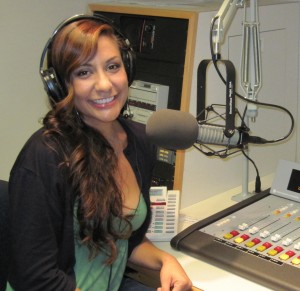29 November 2011
From Wanna-Be Reporter to Voice of America Journalist
Posted by mcadams

Dione Rossiter, 2011 AGU Mass Media Fellow, spent her summer in the Voice of America newsroom in Washington, D. C.
After four busy summers studiously measuring the minute details of clouds, I spent my last summer as a graduate student in a newsroom, far away from the cockpit of a cloud-probing airplane. It was not just any newsroom but Voice of America’s politically charged newsroom in Washington, D. C. Almost overnight, this California-for-lifer was living and working amid the hustle and bustle of the nation’s capital.
As a half researcher–half science educator and wanna-be science writer, I had long dreamt about working as a science reporter for a summer. I had spent the past 5 years as a graduate student at the University of California, Santa Cruz in the Earth and Planetary Sciences Department working on my thesis research on the microphysics of summertime marine clouds.
Then, last fall, knowing I had the chance to be away from my atmospheric research for a couple of months, I applied for an American Association for the Advancement of Science (AAAS) Mass Media Science and Engineering Fellowship. AAAS runs the fellowship program, and AGU supports a fellow each summer to work as a science journalist for a media outlet somewhere in the country. This gives young Earth and space scientists the opportunity to hone their communication skills and learn what it is like to be a reporter, while at the same time giving some lucky media outlet such as NPR, CNN, or Newsweek some much needed science expertise in its newsroom, albeit for only a brief time. It was not long before I had put my thesis on hold and moved across the country to begin my 10-week stint as a science broadcast journalist.
I gave voice to issues ranging from the dangers of binge drinking to threats to deep-sea ecosystems. I spent my days researching possible stories, interviewing scientists, writing radio scripts, and then recording, producing, and editing my stories (all skills I have yet to master). I spent my nights enjoying everything Washington has to offer in the summer.
I loved every minute of my experience.
My favorite part of the science writing process was reading about the coolest and most influential science that was being published around the world each week. Topics spanned a broad range of fields, some so different from my own I would have never been exposed to them otherwise. The most challenging part was reading my stories aloud. I sat for hours with Voice of America voice coaches repeating myself over and over again until each word was up to broadcast quality.
The most notable and unique opportunity I had was attending the AGU-sponsored congressional briefing on Capitol Hill entitled “Severe weather warning—The nation’s weather satellites…your life may depend on them.” Going to the briefing was already exciting enough, but the topic was right up my alley. As an atmospheric scientist, I am quite naturally a weather geek.
The briefing did not disappoint. The panelists were engaging and eloquent, and they included personal anecdotes from their experiences with severe weather events such as the series of tornadoes that touched down on 24 May in the Oklahoma City area. I was moved by the briefing and I wrote a story about it; it ended up being my favorite piece from the entire summer.
Back at school, surrounded by scientists and working hard on my thesis again, I have begun to reflect on my summer, which seemed to fly by way too fast. I realize I am less of a wanna-be science writer these days and more of a science enthusiast who has been successfully exposed to the art of science communication. Since I have been back in Santa Cruz I have been asked to speak in classes about my experiences over the summer, my peers are coming to me for advice and edits on their written work and presentations, I have been asked to write for an informal blog, and I have been asked to write an opinion piece for a well-established think tank. As you can see, I have begun to implement the skills I learned over the summer in my own career and to disseminate those skills to other scientists who, like me, are interested in science literacy, scientific progress, and science advocacy.
By Dione Rossiter, 2011 AGU Mass Media Fellow
This article originally ran in the Nov. 29 issue of Eos.


 The Plainspoken Scientist is the science communication blog of AGU’s Sharing Science program. With this blog, we wish to showcase creative and effective science communication via multiple mediums and modes.
The Plainspoken Scientist is the science communication blog of AGU’s Sharing Science program. With this blog, we wish to showcase creative and effective science communication via multiple mediums and modes.